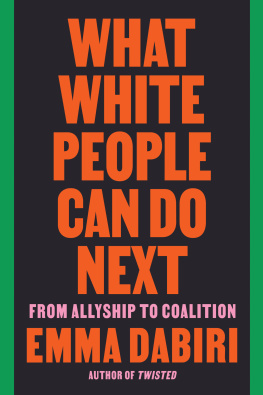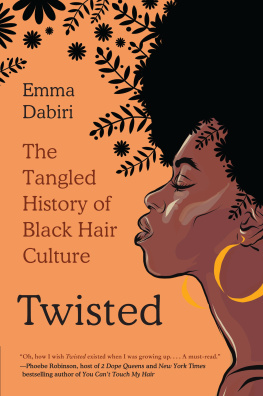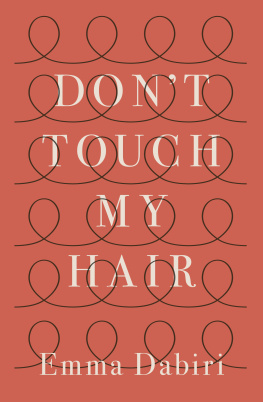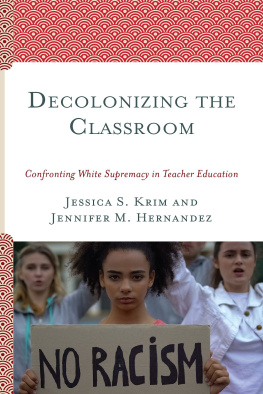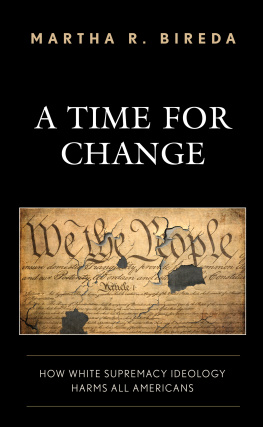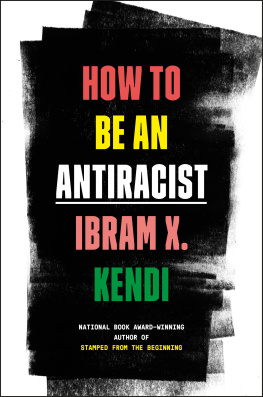Contents
Guide
Our passion for categorization, life neatly fitted into pegs, has led to an unforeseen, paradoxical distress; confusion, a breakdown of meaning. Those categories which were meant to define and control the world for us have boomeranged us into chaos.
James Baldwin, Notes of a Native Son
There is something open and unending in all of us that cannot be contained by the categories of sociological explanation.
Jonathan Rutherford
Contents
Over the years, I have had countless people ask me for advice on allyship, but until relatively recently I declined, beyond cursory responses. With most of my work to date, I have felt my creative energy was best placed centering on people of African descent, and Ive been fascinated by Black Atlantic cultures for as long as I can remember. The Black Atlantic, a concept coined by Paul Gilroy in 1993, is a lens through which to explore blackness beyond the limits of the nation-state. The term incorporates the United States and the Atlantic coastline of Africa, as well as attending to the existence of Black European cultures that have been traditionally sidelined. For me, shining a light on something powerfully generative yet willfully obscured seemed far more useful and, quite frankly, fulfilling than focusing on white people, or instructing them on pointers to better recognize my humanity. Yet there has always been the assumptiongenerally from people racialized as whitethat my interest is in racism, or indeed the word of the moment, antiracism. When I returned to Dublin during university holidays as an African Studies undergrad, after telling people what I was studying it wasnt uncommon to be met with an affronted, Oh what, yeah, so youre real anti-white then? A baffling response, but one I encountered more frequently than you might imagine. Over the years this changed: the automatic assumption that I was a closet black supremacist declined, but suspected anti-white sentiment on my part was replaced with the belief that a degree in African Studies equated to studying antiracism. Recently, I recall having a public discussion in which we touched on Afrofuturism, philosophy, and ancestral veneration and its relationship to African concepts of time, as well as the trajectory between the blues and trap music. I enjoyed it immensely and found the interviewers questions refreshing. Apparently, not everyone felt the same way. At the end of the event, I was approached by a woman who worked in development somewhere in Africa. She said she enjoyed the conversation but felt it was a wasted opportunity; she wanted us to discuss allyship! My heart sank.
Now, through my experiences of being racialized as black in a homogeneously white society as well as through my studies, I had become an inadvertent expert in racism, and had learned that it was impossible to study African history without studying Europe, racism and colonialism, and a good dollop of white supremacy too! I did go on to write my PhD thesis on the construction of racial categories, but that was much later. I find it remarkable that an academic racialized as white studying, lets say, English folklore would never be automatically assumed to have an interest in racism. White people have not been overdetermined by their race, which is precisely why we have often witnessed scenes of obscene outrage in those moments when whiteness is pointed out and remarked upon. Recall the backlash, not to mention the complaints to Ofcom (the UK communications regulator), when the Channel 4 newscaster Jon Snow remarked that hed never seen so many white people in one place, while describing a pro-Brexit rally. That outrage hasnt gone away either, and the kickback against the Black Lives Matter protests has asserted itself in numerous ways, most pointedly in the British governments threat to ban the teaching of what they term critical race studies.
But my reluctance to offer allyship advice was about more than all that. Honestly, the word ally itself jarred me; I didntI still dontlike it. The power dynamic it reproduces makes me feel icky, and Ive seen way too many guides talking about the ally and the victim. In short, I find a lot of the discourse patronizing, both on a personal level and with regard to the prospective ally. It is not a world-making practice.
Indeed, I see a historic opportunity to reconfigure attitudes and reignite imaginations being squandered by an antiracist narrative that inadvertently reinforces much of what it claims to want to overcome, and that in many ways alienates people who might be otherwise persuaded.
One of the things that allyship fails to address is the fact that you can continue to view black people as inferior while still being committed to their protection. When I remembered that many of the nineteenth-century antislavery abolitionists were themselves racists who held deep-seated beliefs about black inferiority, I felt even more uncomfortable with the whole ally movement. Where the abolitionists differed most from the racist slaveholders was in their response to how racial inferiors should be treated; on the belief in inferiority itself they were often in agreement.
In certain ways, todays antiracists are the abolitionists of the twenty-first century. A commitment to allyship with black people doesnt automatically mean you dont think black people are somehow inferior: it means you dont think they should be treated discriminatorily as a result. Moreover, the idea that antiracism is an act of grace that benefits the poor black victim obscures the psychological investment in, as well as the costs of, whiteness, the losses that are imbibed from its poisoned chalice, for white people too: capitalism, patriarchy, and white supremacy have seduced and press-ganged people into servitude.
Naming whiteness is necessary; it is the invisibility of white people, who are presented just as people, the default norm from which everyone else deviates, that is part of its normative power-making. Yet the more you state and claim your whiteness, without doing any further work to unpack what that means, the more you become fixed to that articulation of self, the more you become wedded to whiteness. Some of the most racist societies have been ones with pronounced white identities that coexist vis--vis racialized others.
Unfortunately, much of the present antiracist conversation is ahistorical and lacking in this analysis. It is also generally devoid of analysis of class or capitalism, which it seems to have largely replaced with interpretations of interpersonal privilege. As such, I have very intentionally engaged with texts from earlier generations of intellectuals and activists whose work comes with a different set of priorities, aims that seem both clearer and more collective. The 1971 Rap on Race is a public conversation between two of the heavyweight public intellectuals of the time, the illuminating James Baldwin and the (somewhat aggravating) anthropologist Margaret Mead. Baldwin reminds us that one of the persistent truths of whiteness is that all Europeans have a deadly temptation to feel a sense of biological superiority. Whiteness is always there, ever-present, determining who gets a chance and who is denied opportunity. But recently I have been starting to visualize it like a horror-film ghoul: its looming in the shadows, its threatening, but we can really activate, energize, and empower it by saying its name three times in the mirror. However, once evoked, what the fuck do we do with it? If we summon it and just leave it at large, free to run rampant and unchecked, its game over as were all subsumed by its murderous rampage. Much like the horror-film baddie, we should invoke it only to slay it. Without that second, crucial part, we remain under siege, doing its bidding, in thrall to its promises and lies.

